Rule 39 Pro Bono Initiative
An award-winning initiative hosted by CILD with the support of DLA Piper, Eversheds Sutherland, Freshfields, Herbert Smith Freehills, Linklaters, Orrick, and Osborne Clarke, and led by Dr Daria Sartori.
Since 2021, CILD is proud to be hosting, with the support of 8 international law firms, the Rule 39 Initiative for the protection of the human rights of asylum-seekers, refugees and migrants in Europe, led by Dr Daria Sartori, who is assisted by Muriel Vicquery.
Since the Rule 39 Initiative began, it has assisted over 500 people and has provided over 4,000 hours of pro bono legal support.

Currently, changes in migration flows in Europe, including those due to the crises which have been unfolding in Ukraine and Afghanistan more recently, are leading to the increased frequency of violations of the human rights of asylum-seekers, refugees and migrants. These violations are entirely avoidable and punish vulnerable groups seeking assistance.
In response, 8 international law firms and CILD united to deliver the Rule 39 Pro Bono Initiative, a project under which lawyers and experts provide pro bono assistance to vulnerable foreigners, and to the NGOs working with them, in submitting cases to the European Court of Human Rights.
The work of the Initiative is led by Dr Daria Sartori, a lawyer and expert in European Court of Human Rights actions. Dr Sartori provides to the volunteer lawyers of the partner law firms the necessary training and supervises their work within the Initiative.
Since it began in October 2021, The Rule 39 Initiative has been steadily securing life-altering support to asylum seekers, refugees and migrants across Europe.
WHY RULE 39?
The project derives its name from Rule 39 of the Rules of the European Court of Human Rights , a provision allowing applicants to seek interim relief in case of imminent risk of irreparable damage. Rule 39 requests are typically utilised by NGOs to:
- Stop collective pushbacks of asylum-seekers
- Prevent expulsion or extraditions of vulnerable individuals to countries where their human rights are at risk
- Ensure the provision of dignified reception conditions
- Ensure the provision of life-sustaining food and water to refugees and asylum seekers stuck at or between borders.
Thanks to its fast effects, Rule 39 can be used to stop active human rights abuses. It is, however, a scarcely known, and often mishandled, tool. The Rule 39 initiative’s initial focus was on assisting NGOs to use this form of relief more effectively.
Faced with a wider need for assistance, the project now also considers individual applications under Article 34 of the ECHR.
WHO IS ASSISTED WITHIN THE RULE 39 INITIATIVE?
Given the regime change in Afghanistan at the time of the project’s launch, the Rule 39 Initiative was initially focusing on Afghan individuals. Subsequently, given the unfortunately extensive need in this area, and confronted with further migration crises, the project has been expanded to benefit asylum-seekers, refugees and migrants in need from other nationalities, where there is a need for assistance within the territory of any Council of Europe member state.
